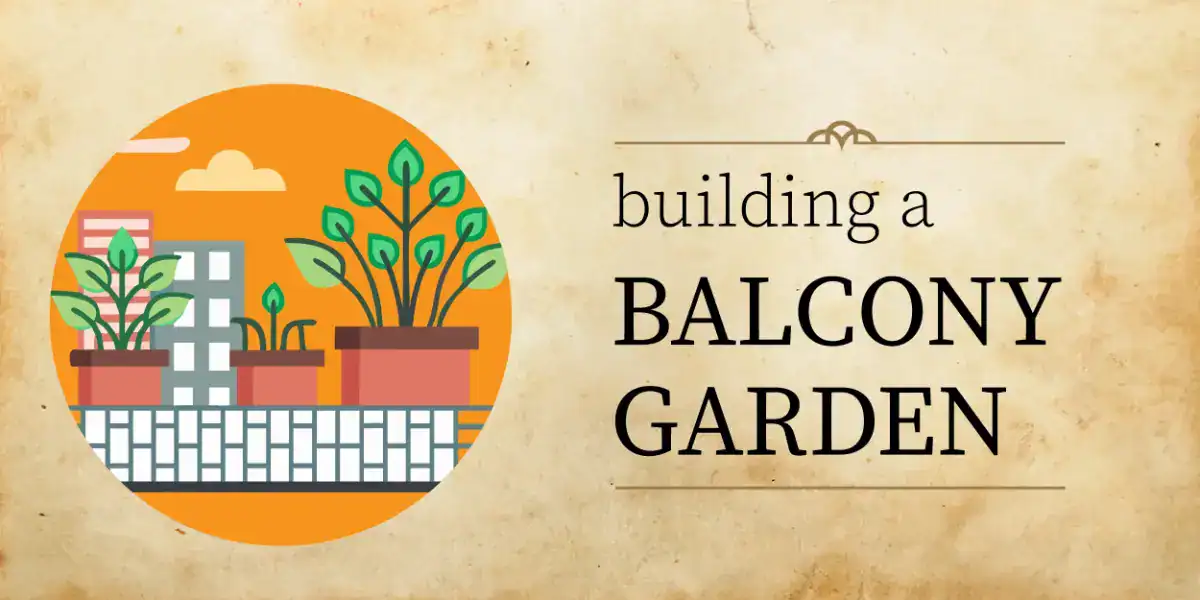Balcony gardening dates back to Ancient Rome, where affluent citizens adorned their villas with hanging and potted plants on upper floors.
The trend re-emerged during the Industrial Revolution as cities grew more congested, prompting residents to reclaim small outdoor spaces for personal greenery.
European cities like Berlin, Amsterdam, and Paris have strong traditions of balcony gardening. In densely populated Asian cities like Tokyo, Hong Kong, and Singapore, balcony gardens are essential for residents seeking green relief amid concrete surroundings.
And in North America, metropolitan areas like New York, Toronto, and Los Angeles are hotspots for balcony gardening.
Why Start a Balcony Garden?
No yard? No space? You can still enjoy the freshest produce if you have a raised outdoor platform suitable for plants.
The benefits of balcony gardening are many:
- Plants purify the air, reducing pollutants and boosting oxygen levels.
- Greenery enhances your outdoor space, making your balcony a tranquil escape.
- Home-grown vegetables, berries, or herbs reduce your reliance on chemically-treated, store-bought produce.
- Gardening lowers cortisol levels, which helps with stress relief and mental health.
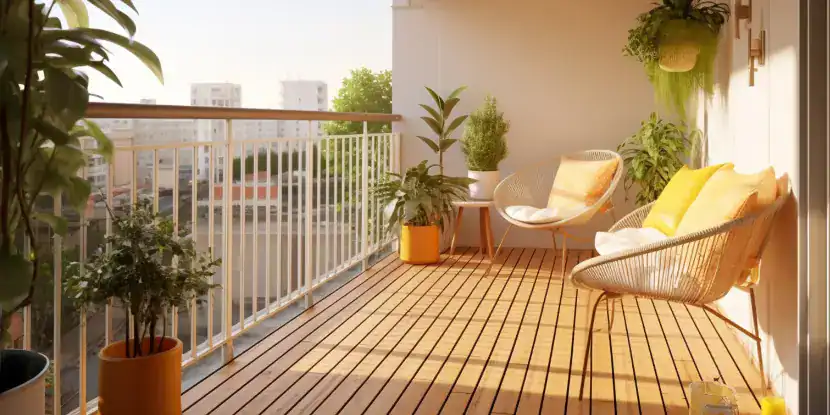
Even a few plants can make your balcony feel more inviting.
Space-Saving Gardening Techniques
Even the smallest balcony can be transformed into a lush garden. The three most popular techniques are container, vertical, and hydroponic gardening.
1. Container Gardening
Plants are grown in pots or containers, allowing complete control over soil quality and placement.
Pros
- Highly flexible for small spaces.
- Containers can be moved to suit the sun’s position.
- Choice of creative containers (terracotta pots, upcycled tins).
Cons
- Requires frequent watering since containers dry out faster.
- Limited root space may restrict plant growth.
Best Plants for Container Gardening
- Herbs like basil, parsley, and mint.
- Compact vegetables, like cherry tomatoes or lettuce.
- Annual flowers like petunias or marigolds.
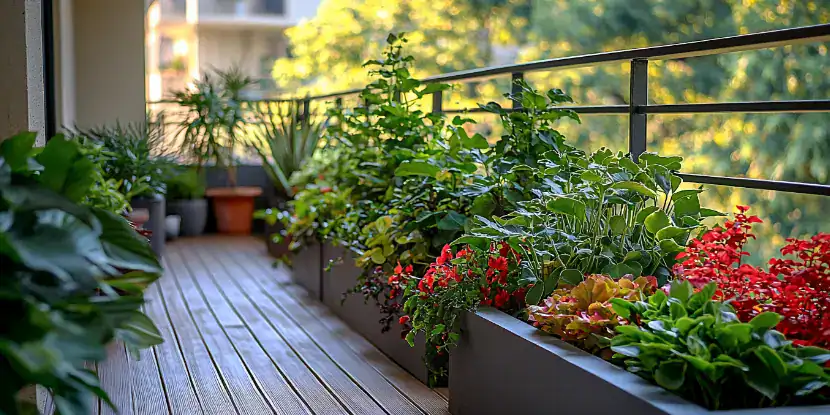
An elaborate balcony container garden. You can start smaller, if you like.
2. Vertical Gardening
This technique uses shelves, palettes, hanging pots, or climbing plants to grow upwards rather than outwards.
Pros
- Saves floor space for additional plants.
- Adds height and interest to a balcony.
- Visually striking, especially with cascading or hanging plants.
Cons
- Some plants may struggle to grow vertically without proper support.
- Watering can be challenging, especially for plants higher up.
Best Plants for Vertical Gardening
- Climbing plants like ivy or peas.
- Hanging plants like spider plants or ferns.
- Strawberries or small peppers in hanging pots.
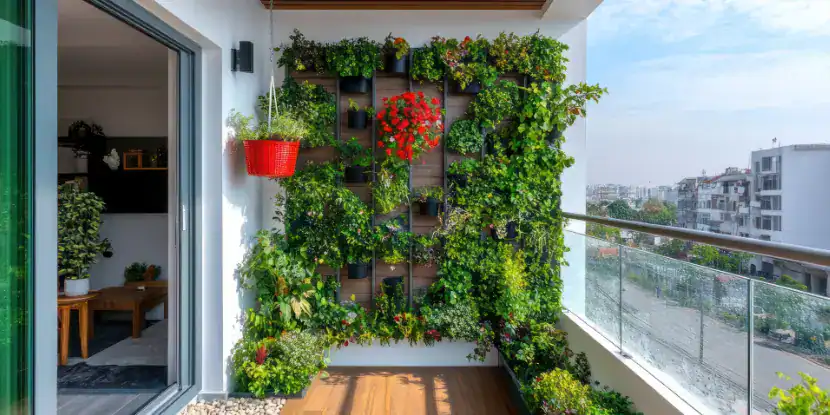
Vertical gardens save space and take advantage of unused vertical surfaces like walls, railings, and fences.
3. Compact Hydroponic Gardening
For tech-savvy gardeners, hydroponics offers a soil-free way to grow plants using nutrient-enriched water systems. This gardening technique also works exceptionally well indoors under grow lights.
Pros
- Efficient use of water and space.
- Faster plant growth compared to traditional soil methods.
- Perfect for year-round gardening.
Cons
- Higher initial cost due to specialized equipment.
- Requires understanding of pH and nutrient balance.
Best Plants for Hydroponic Gardening
- Leafy greens like spinach and arugula.
- Herbs like cilantro and dill.
- Berries like strawberries.
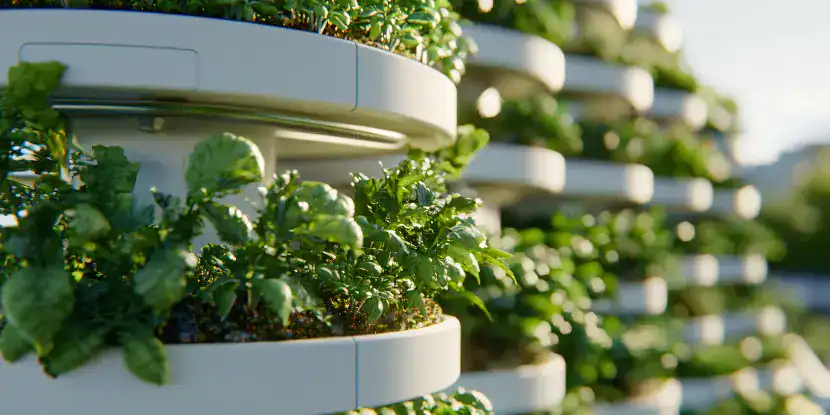
Hydroponic gardening equipment with stackable trays can be purchased online or at select garden centers.
Protecting Your Balcony Plants from Heat & Harsh Sun
Balconies are often exposed to unfiltered sunlight, which can damage delicate plants. Here’s how to protect them.
Shade Solutions
- Install shading materials like garden netting, umbrellas, or sheer curtains to diffuse sunlight.
- Rotate containers to prevent plants from prolonged exposure to direct light.
Watering Tips
- Water early in the morning or late in the evening to minimize evaporation.
- Use self-watering pots for consistent hydration.
Mulching
Adding mulch around your plants helps retain soil moisture and keeps roots cool. Organic materials like wood chips or shredded leaves work best.
Choosing the Right Flowers, Vegetables & Berries for Your Balcony
The best plants for balcony gardening are low maintenance and have compact growth habits.
Flowers
- Marigolds and geraniums inject vibrant color and are easy to maintain.
- Begonias are perfect for shaded balconies.
- Petunias add cascading beauty when grown in hanging pots.
- Pansies tolerate cooler temperatures and add color to your balcony year-round.
Vegetables
- Lettuce and spinach grow quickly and don’t require deep soil.
- Cherry tomatoes can thrive in containers with proper sunlight.
- Peppers (sweet or spicy) perform well in small spaces.
- Radishes and turnips are fast-growing vegetables perfect for small areas.
- Microgreens are another excellent option for urban balcony gardening.
Herbs
- Most herbs can be grown in pots or containers.
- Basil, parsley, and chives are good choices for beginners.
- Mint is a fast-growing herb that should be planted alone in a container to prevent it from crowding out other plants.
- Rosemary, thyme, and oregano prefer well-drained soil and plenty of sunlight.
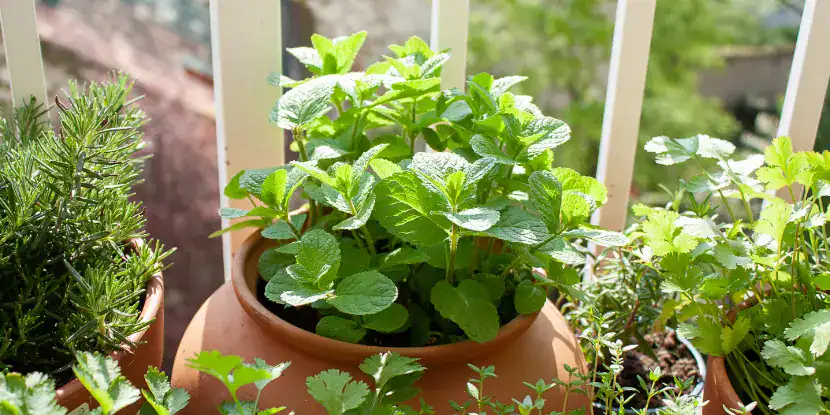
Most herbs grow splendidly in containers.
Fruits
- Dwarf fruit trees like citrus and fig can be grown in containers.
- Dwarf apple, pear, cherry, and peach tree varieties are also suitable for container gardening.
- Strawberries are ideal for hanging baskets or vertical setups.
- Blueberries can be grown in pots with acidic soil.
- Raspberries thrive in medium-sized containers, provided they’re pruned.
Additional Tips
General Tips
- Maintain consistent watering schedules, especially for plants in hydroponic or vertical systems that dry out quickly.
- Regularly prune and monitor plants for signs of pests or disease.
- Fertilize your plants every few weeks with a balanced liquid fertilizer.
Container Gardening
- Always consider the size and growth habits of the plants you choose.
- Ensure containers have adequate drainage holes to prevent waterlogging and root rot.
- Use lightweight, high-quality potting mix formulated for container gardening.
- Monitor soil moisture levels and water regularly, especially during hot weather.
Vertical Gardening
- To maximize space, incorporate vertical gardening solutions such as wall planters, trellises, or plant towers.
- Choose climbing plants like beans, peas, or cucumbers for vertical setups to use sunlight efficiently.
Hydroponic Gardening
- Select systems that fit your balcony space, such as nutrient film technique (NFT) or Kratky method setups.
- Use a timer to ensure consistent watering cycles and nutrient delivery.
- Experiment with crops that do well in hydroponic setups, such as leafy greens, herbs, and cherry tomatoes.
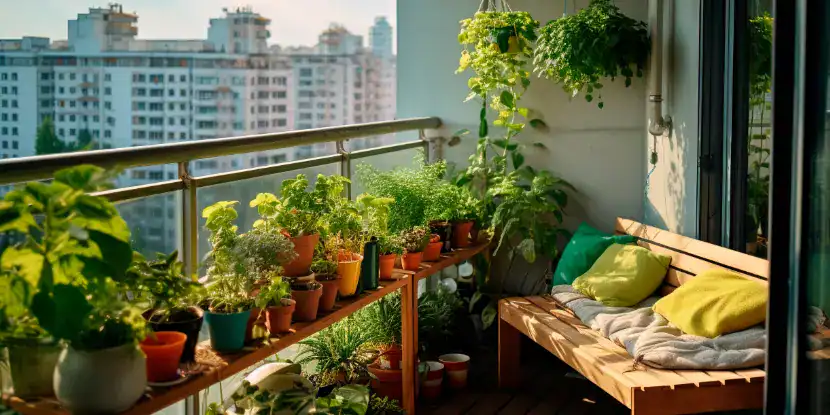
This balcony garden combines container, vertical, and hanging plant techniques.
FAQs: Balcony Gardening
Q: How do I start a balcony garden as a beginner?
Begin with easy-to-grow plants like herbs or lettuce, and use containers that suit your balcony size. Start small and expand as you gain confidence.
Q: Do balcony gardens attract insects?
Yes, but you can manage them with natural repellents like neem oil or companion planting with marigolds, which deter pests.
Q: Can I grow a garden on a shaded balcony?
Yes, if you choose shade-loving plants like begonias, ferns, or lettuce.
Q: How do I avoid overwatering my plants?
Ensure containers have proper drainage holes and water only when the soil feels dry. You can also purchase a moisture meter for plants.
Q: Can I grow fruit trees on my balcony?
Dwarf varieties of citrus trees, like lemons or limes, are perfect for containers.
Q: What tools do I need to maintain my balcony garden?
Basic tools like a hand trowel, pruning shears, watering can, and gloves suffice for most balcony gardens.
Q: How do I keep my plants healthy during extreme heat?
Use shading materials, water more frequently, and mulch to retain soil moisture and regulate root temperature.
Q: Can I compost on my balcony?
Yes, with small systems like worm composters or bokashi bins.

